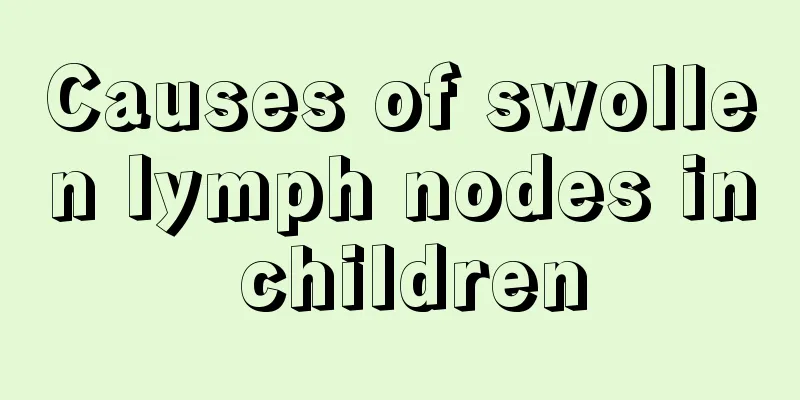Causes of swollen lymph nodes in children

|
Many people have a deep understanding of the disease of swollen lymph nodes, and some people have even suffered from this disease. However, if a child is said to have swollen lymph nodes, many people will not believe it and will find it incredible. The harm of children suffering from swollen lymph nodes is the same. If I want to treat this swollen lymph node disease for my child, I must first find out the cause of the child's illness. So what are the causes of swollen lymph nodes in children? There are many reasons for swollen lymph nodes in children, so we need to treat them differently. Some chronic local inflammations can cause swollen lymph nodes in children, and infectious diseases can also cause swollen lymph nodes in children. What are the causes of swollen lymph nodes in children? Parents often feel movable "lumps" the size of mung beans or soybeans behind their children's ears, neck or jaw. How to identify whether it is normal or not? Children do not feel pain when these bumps are touched and generally do not need to be treated. These are normal superficial lymph nodes in the human body. If the enlarged lymph nodes are found to be larger than soybeans, either singly or in clusters, and the child cries or screams in pain when touched, parents should pay attention. Because it is one of the symptoms of many diseases in children, common diseases are divided into the following three categories: 1. Chronic local inflammation such as oral tonsillitis, dental caries, periodontitis, seborrheic dermatitis, otitis media, etc. can cause enlargement of the submandibular, occipital and behind-the-ear lymph nodes. 2. Tuberculous inflammation After being infected with Mycobacterium tuberculosis, children may also have swollen and painful lymph nodes in the neck, behind the ears, and under the jaw, accompanied by low fever, night sweats, weight loss and other symptoms. 3. Infectious diseases and systemic infections such as measles, chickenpox, infectious mononucleosis, systemic chronic infections and leukemia. At this time, swollen lymph nodes can be felt in superficial parts of the body. Which swollen lymph nodes should be taken seriously? Lymph node enlargement caused by acute infection and tuberculosis infection should be prevented and treated, but lymph node enlargement caused by some systemic diseases should be taken more seriously. For example, some children have systemic diseases, with persistent high fever, redness of the skin all over the body, and significantly enlarged cervical lymph nodes. This is most likely caused by a highly toxic Staphylococcus aureus sepsis, which can be life-threatening if not treated in time. Some people have a fever for 1 to 2 weeks and their face, palms, and skin become red. The conjunctiva and oral mucosa of the eyes are also red. There are also rashes on the skin and the lymph nodes in the neck appear particularly large. This is a disease called mucocutaneous lymph node syndrome, which may cause heart disease. Even more serious are some malignant diseases, such as Hodgkin's disease, lymphosarcoma, reticulum cell sarcoma, leukemia, etc., which can cause lymph node enlargement. If not treated in time, the whole body condition will gradually deteriorate and often endanger life. If you encounter lymph nodes that are significantly enlarged, adhere to each other, cannot move, are tender, or if there is generalized lymph node enlargement accompanied by anemia or severe systemic symptoms, you must promptly ask a doctor for further examination for early treatment and do not neglect it. The above introduces the various causes of swollen lymph nodes in children. Our human body has many lymph nodes. If a child has swollen lymph nodes, he must be treated in time, but you must first observe the child's symptoms. Many times, the symptoms of this swollen lymph node disease are not obvious in the early stages and it is difficult for people to detect it, so the best treatment is often missed, which leads to cancer. After knowing the cause, when treating the child, it is necessary to avoid the child's contact with the cause. |
<<: What should I do if my baby keeps coughing?
>>: Causes of sticky stools in babies
Recommend
What should I do if my child coughs after eating candy?
Many children often cough due to carelessness in ...
What are the symptoms of gastroenteritis in children?
Children are prone to gastroenteritis due to thei...
What are the symptoms of ADHD in children?
I believe that in normal life, many parents will ...
How to treat allergic dermatitis in children?
Allergic dermatitis is a skin disease that may oc...
What to do if your child has red and swollen gums
Children's teeth are in a developmental stage...
Why do children often hold their breath?
Many children often suffer from breath holding wh...
The benefits of drinking student milk
Everyone knows that milk is an indispensable nutr...
Nursing and treatment of hydrotesticular effusion in infants
The phenomenon of hydrotesticular effusion in inf...
Symptoms of a one-year-old baby being frightened
Parents attach great importance to their baby'...
What can I feed my kids to make them grow taller?
Nowadays, the growth environment and living condi...
Child's face twitching
Since children's bodies are not fully develop...
Can children eat more watermelon?
When summer comes, the weather is scorching hot. ...
5-year-old child grinding teeth at night
We often see people grinding their teeth while sl...
Child speaks late
After a child is born, his or her parents are pre...
Can babies eat taro at five months old?
We all know that babies need to add complementary...









